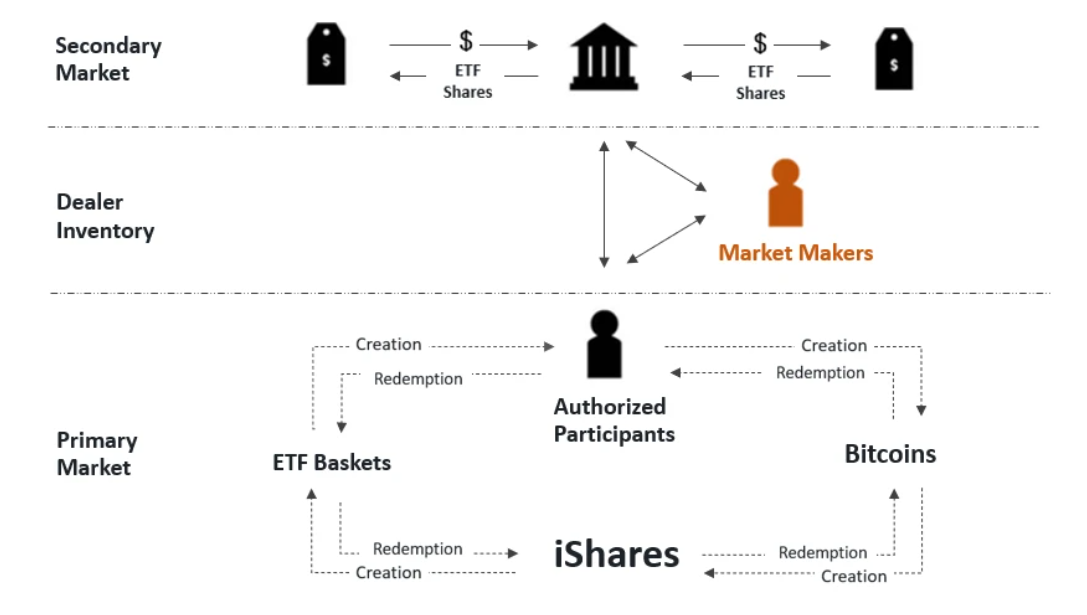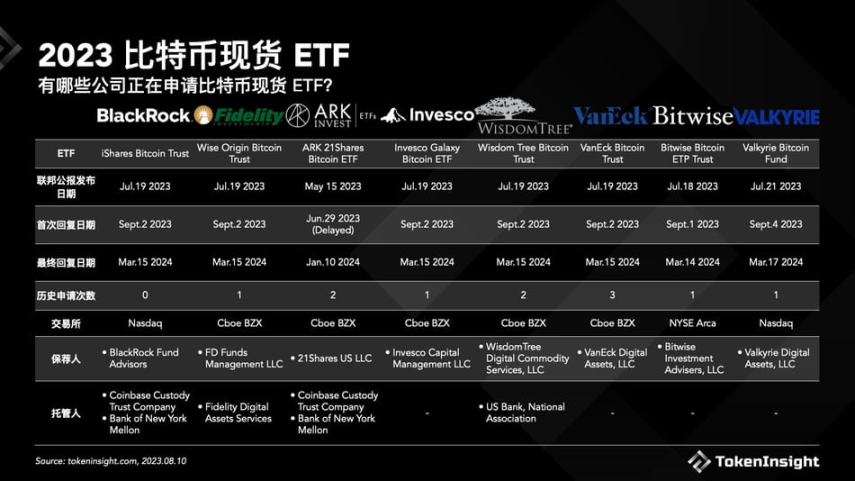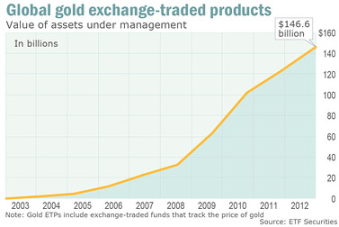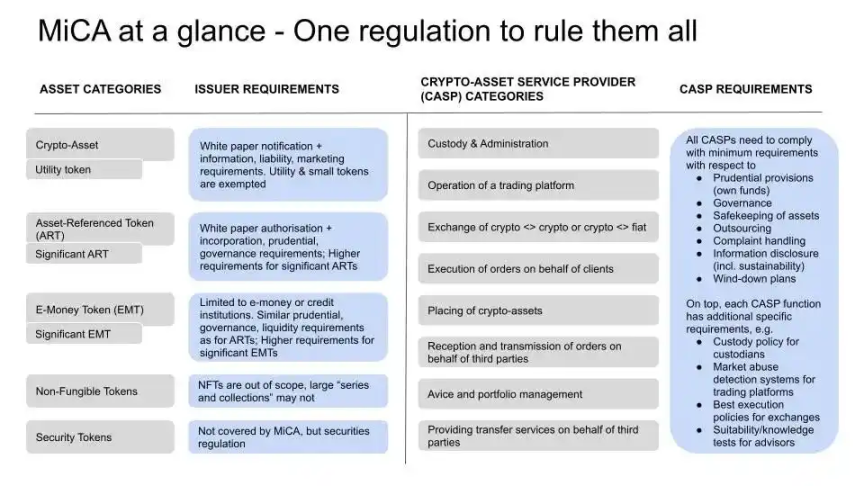Author: PSE Trading Intern @JohnHol
After the SEC rejected multiple Bitcoin spot ETF applications in recent years, in August of this year, the SEC's rejection of the conversion of GBTC to a Bitcoin spot ETF was overturned. At the same time, the world's largest asset management institution, BlackRock, and several other institutions simultaneously submitted applications for Bitcoin spot ETFs to the SEC. The arrival of Bitcoin spot ETFs is unstoppable.
What is a Bitcoin Spot ETF
A cryptocurrency exchange-traded fund (ETF) is a fund that tracks the price of one or more cryptocurrencies through investing in cryptocurrency or related instruments. The widely discussed Bitcoin ETF is a type of ETF that tracks the price of Bitcoin, including Bitcoin futures ETFs and Bitcoin spot ETFs. The main difference is that the underlying asset for the shares of Bitcoin futures ETFs is Bitcoin futures contracts, while the underlying asset for the shares of Bitcoin spot ETFs is Bitcoin.
The most significant feature of ETFs compared to regular mutual funds is that ETF shares can be traded on traditional stock exchanges like stocks. This means that if a Bitcoin spot ETF is approved, investors do not need to go through complex processes—such as downloading wallet plugins, creating public-private key pairs, or trading through centralized exchanges—but can directly purchase ETF shares to enjoy the returns of Bitcoin. While these processes may not be difficult for those familiar with them, they still present a barrier for investors who are completely unfamiliar with cryptocurrency assets. The Bitcoin spot ETF reduces this barrier and provides these investors, especially institutional investors, with familiar financial instruments and a sense of legal protection.
As for how a Bitcoin ETF operates, taking the Bitcoin spot ETF as an example, the issuing institution first purchases Bitcoin assets, either directly from Bitcoin holders or through centralized exchanges. These assets are stored in a Bitcoin wallet with multiple layers of protection, such as a cold wallet. Next, the issuing institution creates fund shares, the value of which closely follows the fluctuation of Bitcoin prices. In this process, Authorized Participants are responsible for creating and redeeming fund shares. They are usually large financial institutions and often act as market makers in the secondary market. Investors can buy or sell fund shares on traditional stock exchanges, just like trading stocks. In addition, Authorized Participants need to arbitrage the price difference when there is a premium or discount on the fund shares to ensure that the price of the fund shares is consistent with the cost of Bitcoin.

The first Bitcoin ETF is the ProShares Bitcoin Strategy ETF (BITO), a Bitcoin futures ETF, which began trading on the Chicago Mercantile Exchange in October 2021. However, the SEC has not yet approved any Bitcoin spot ETFs.
The first financial instrument to create shares with Bitcoin as the underlying asset is the Grayscale Bitcoin Trust (GBTC), which made its debut in 2013 and began trading publicly in 2015. In January 2020, GBTC was approved and registered by the SEC, becoming the first cryptocurrency investment tool to meet SEC standards. However, GBTC is not an exchange-traded fund but a closed-end fund traded over-the-counter. While GBTC fund shares allow investors to gain exposure to Bitcoin without directly holding it, as a closed-end fund, the price of its fund shares depends on the supply and demand in the secondary market, rather than corresponding to the value of the Bitcoin holdings. Therefore, there is often a price difference between the value of GBTC shares and the value of the Bitcoin holdings.
GBTC has been actively communicating with the SEC, hoping to convert to a Bitcoin spot ETF, but has not been successful. It wasn't until August 2023 that things took a turn when the Washington D.C. Circuit Court of Appeals ruled that the SEC's rejection of GBTC's application to convert to an ETF was incorrect. The SEC needs to re-examine the application, and the SEC did not appeal this ruling. While this ruling does not mean that the SEC must approve GBTC's application, it conveys an extremely positive message to the market.
SEC Approval Process
In simple terms, an institution submits ETF application materials to the SEC, which, once confirmed, publishes a 19b-4 document in the Federal Register. Subsequently, the SEC enters a 240-day approval process and publicly announces the application results or postpones the announcement to the next date on the 45th, 90th, 180th, or 240th day.
The SEC has long expressed concerns about the lack of regulation in the cryptocurrency market, which is a major reason for its rejection of cryptocurrency ETF applications. In its past rejections, the SEC has insisted that the lack of regulation and supervision in the cryptocurrency market, the lack of necessary information transparency, and the difficulty in ensuring asset security have led to "concerns about potential fraud and manipulation," emphasizing the need for full information sharing and supervision in the market.
Following the SEC's defeat in the case of Grayscale, the court ruling prevents the SEC from using "potential fraud and manipulation" as a reason to reject the approval of Bitcoin spot ETFs. However, the SEC may still find other reasons to reject the approval of Bitcoin spot ETFs.
Current Status of Bitcoin Spot ETF Applications
In addition to Grayscale, several institutions have applied for Bitcoin spot ETFs with the SEC in 2023. For example, BlackRock's iShares Bitcoin Trust, Fidelity's Wise Origin Bitcoin Trust, and Ark Invest's ARK 21Shares Bitcoin ETF. It is worth noting that most of these institutions are not applying for the first time. After years of negotiations with the SEC, they have resubmitted their Bitcoin spot ETF applications almost simultaneously this year, including BlackRock's first application. BlackRock is known for issuing index-tracking funds, and its flagship product, iShares, holds nearly 50% of the market share in the U.S. ETF market, with a success rate of close to 100% in ETF applications. This is also an important factor in the market's belief that Bitcoin spot ETFs will be approved next year.

Furthermore, institutions represented by BlackRock have fully adjusted their strategies. To alleviate the SEC's concerns, institutions such as BlackRock have proposed Surveillance-Sharing Agreements, a method to mitigate market manipulation and fraud risks. Surveillance-Sharing Agreements are agreements between cryptocurrency exchanges and market regulatory agencies that allow both parties to share trade data and information for monitoring. If there is suspicious trade data or information, this information will be simultaneously sent to regulatory agencies, ETF issuers, and cryptocurrency exchanges. Both BlackRock and Ark Invest have chosen Coinbase Custody Trust Company as their Bitcoin custodian and the Bank of New York Mellon as their cash custodian.
From past experience, the SEC typically does not approve Bitcoin spot ETFs in advance, choosing instead to announce the results on the final approval date. Currently, the closest to the final approval date is the ARK 21Shares Bitcoin ETF applied by Ark Invest, which will have results announced on January 10, 2024. BlackRock and several other institutions have their final approval date on March 15, 2024. According to Reuters, discussions between the SEC and asset management institutions applying for Bitcoin spot ETFs have delved into key technical details, including regulatory arrangements, and purchase and redemption mechanisms. This indicates that the SEC may soon approve these products. We may see the approval of Bitcoin spot ETFs as early as January 10 next year.
Market Impact of Bitcoin Spot ETFs
Taking the example of gold spot ETFs, on March 28, 2003, the first gold spot ETF, ETFS Physical Gold, was approved in Australia, followed by the approval of the world's largest gold spot ETF, SPDR Gold Trust, in the United States on November 18, 2004. This had a significant impact on the global gold market. Over the next decade, the price of gold rose from $332 per ounce to $1600 per ounce.

Before the introduction of gold spot ETFs, investors had difficulty investing directly in gold. They often could only gain exposure to gold by purchasing gold bars, but the low liquidity and efficiency of this method deterred many investors. The approval of gold spot ETFs allowed investors to gain exposure to gold without holding it and to trade it as easily as stocks. Through gold spot ETFs, numerous asset management institutions included gold in their portfolios, injecting a massive amount of liquidity into the gold market and leading to a rapid increase in gold prices over the next decade.
In a sense, Bitcoin, often referred to as digital gold, shares many similarities with gold. Bitcoin is seen by mainstream financial markets as a hedging asset, a safe-haven asset, and a familiar asset for diversification. Therefore, despite its volatility, many asset management institutions are willing to include Bitcoin in their portfolios. However, due to compliance and approval processes, mainstream asset management institutions cannot directly hold Bitcoin. What the market urgently needs is a compliant financial instrument to help investors overcome these difficulties, which is the fundamental reason for pushing for Bitcoin spot ETFs.
Bitcoin spot ETFs will become the largest bridge connecting mainstream asset management institutions with a market value of less than $1 trillion and Bitcoin. It will inject trillions of dollars of liquidity into Bitcoin. Bitcoin spot ETFs have the following potential market impacts:
- Increased direct investment in Bitcoin: Bitcoin spot ETFs will attract mainstream investors in the financial market. The high learning costs and lack of financial instruments have historically limited effective investment channels for mainstream asset management industries to invest in Bitcoin. Due to compliance and approval process restrictions, these institutional investors cannot provide direct investment services in Bitcoin or other cryptocurrencies to their clients. The arrival of Bitcoin spot ETFs provides mainstream investors, especially institutional investors, with familiar financial instruments to gain exposure to Bitcoin.
- Enhanced legal recognition of Bitcoin: Bitcoin spot ETFs will further enhance the status of Bitcoin in the mainstream financial system. Traditional asset management institutions often cannot directly hold Bitcoin or buy it from centralized exchanges due to legal factors. Bitcoin spot ETFs can solve this problem, as through Bitcoin spot ETFs, asset management institutions will be able to provide legally protected assets to investors. This can promote legal recognition of Bitcoin in the mainstream market and enhance confidence in Bitcoin in the mainstream market.
- Diversification of asset management institution portfolios: Bitcoin spot ETFs will provide asset management institutions with more diversified portfolios. Compared to existing Bitcoin futures ETFs and financial instruments provided by trust institutions, Bitcoin spot ETFs can provide direct exposure to Bitcoin on one hand and reduce the price difference between the value of the shares and the reserved Bitcoin on the other hand. This is a better financial instrument for asset management institutions wishing to participate in the Bitcoin market.
Prospects for Bitcoin's Future
After more than a decade of development, Bitcoin's acceptance in the mainstream financial market continues to increase. Driven by investors and asset institutions, regulatory agencies, albeit reluctantly, still need to legally recognize the value of encrypted assets like Bitcoin, thereby opening the door to Bitcoin for mainstream asset management institutions.
The approval of Bitcoin spot ETFs is just the beginning of the mainstream financial market entering the encrypted market. Since the beginning of this year, regulatory agencies worldwide have been actively establishing regulatory frameworks for the encrypted market. It is important to note that the actions of regulatory agencies will not affect the resistance to scrutiny of encrypted assets, which is determined by the degree of decentralization of cryptography and encrypted assets. Instead, the actions of regulatory agencies can help investors weed out scams disguised under the guise of technology in the encrypted market and clear obstacles for mainstream financial institutions to enter the encrypted market, establishing norms.
The European Union has made significant progress in establishing a regulatory framework for the encrypted industry this year. Since 2018, the European Commission has been working on establishing a regulatory framework for the encrypted industry and voted to pass MICA (Markets in Crypto-Assets Regulation) on April 20 this year, currently the most comprehensive regulatory framework for the encrypted industry globally. The EU hopes to establish a comprehensive regulatory framework during the vacuum period of encrypted market regulation in the United States, creating legal certainty for large tech companies and asset management institutions to enter the encrypted market, thereby playing a leading role in regulating cryptocurrencies globally.
Compared to Bitcoin spot ETFs aimed at creating a financial instrument for investing in Bitcoin, MICA is more ambitious. Its goal is to pave the way for all institutions to directly invest or participate in the encrypted market.

The market generally expects that with the arrival of Bitcoin spot ETFs and the halving of Bitcoin, coupled with the end of the Federal Reserve's interest rate hike cycle, the market value of Bitcoin will experience unprecedented growth. However, from a long-term perspective, this may just be the beginning. The approval of Bitcoin spot ETFs will undoubtedly be a major turning point in the history of Bitcoin and even the world's financial history. In the future, we will see regulatory frameworks being continuously established worldwide, Bitcoin deeply integrating with mainstream financial markets, and becoming the consensus digital gold for everyone.
References
https://www.investopedia.com/spot-bitcoin-etfs-8358373
https://cn.tokeninsight.com/zh/tokenwiki/all/bitcoin-spot-etf-when-will-be-the-approval-date
https://www.odaily.news/post/5190473
https://www.odaily.news/post/5190823
免责声明:本文章仅代表作者个人观点,不代表本平台的立场和观点。本文章仅供信息分享,不构成对任何人的任何投资建议。用户与作者之间的任何争议,与本平台无关。如网页中刊载的文章或图片涉及侵权,请提供相关的权利证明和身份证明发送邮件到support@aicoin.com,本平台相关工作人员将会进行核查。



